BA Business Management: Community Engagement Reflective Report
VerifiedAdded on 2022/12/27
|7
|2653
|21
Report
AI Summary
This report provides a reflective analysis of community engagement, focusing on the application of reflective models to personal experiences within the context of a BA Business Management module. The report begins with an introduction to community engagement and its importance, followed by a detailed examination of two reflective models: Gibbs' reflective cycle and John's model of reflection. The student compares these models, recommending Gibbs' model for its practicality. The main body then applies the recommended model to the student's personal experience and learning throughout the module, followed by a reflection on the relationship between academic theories and practical experience. The report concludes by summarizing key findings and insights gained from the reflective process. The report uses the example of Tesco PLC to illustrate the concepts discussed. The analysis emphasizes the importance of reflection for future growth.
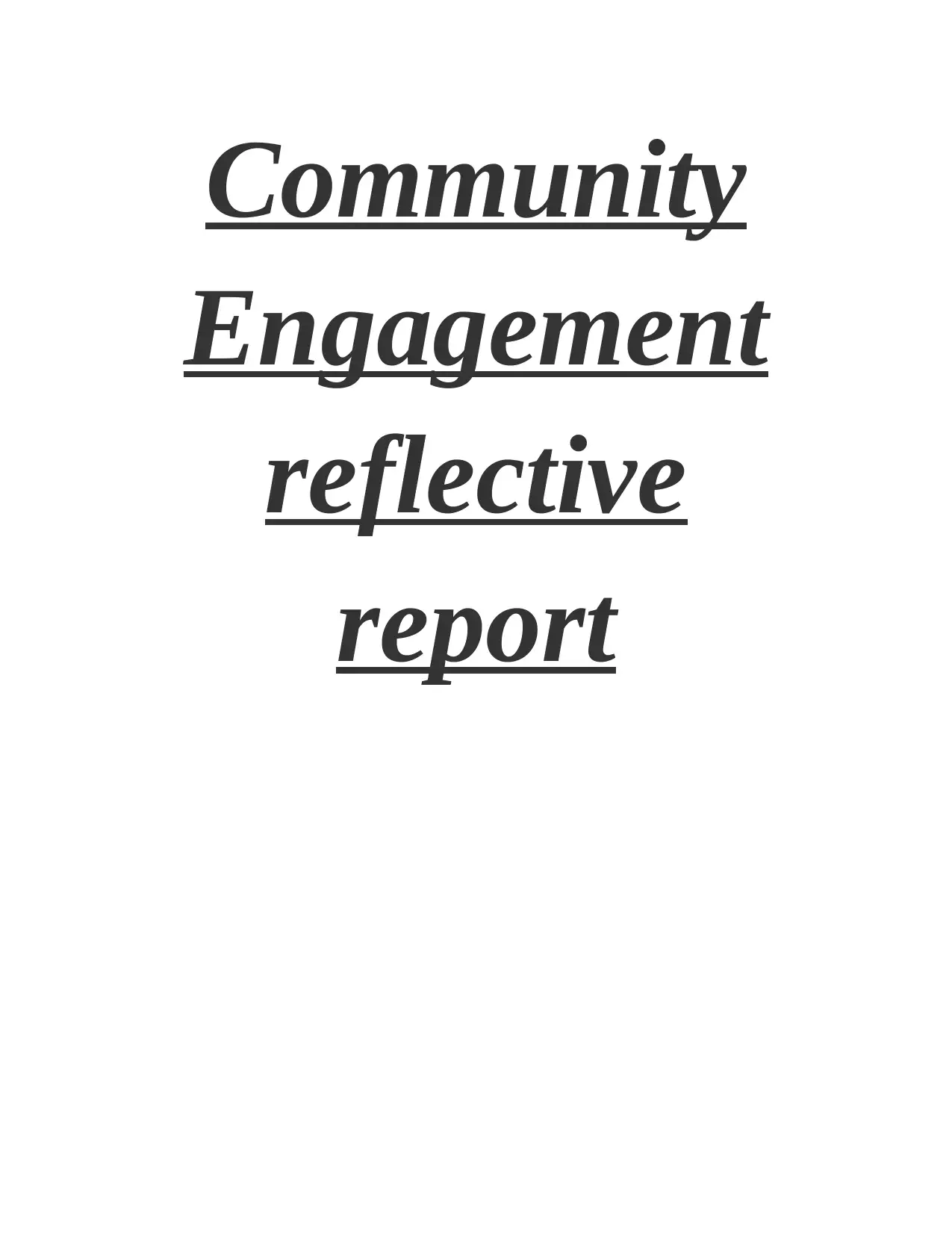
Community
Engagement
reflective
report
Engagement
reflective
report
Paraphrase This Document
Need a fresh take? Get an instant paraphrase of this document with our AI Paraphraser
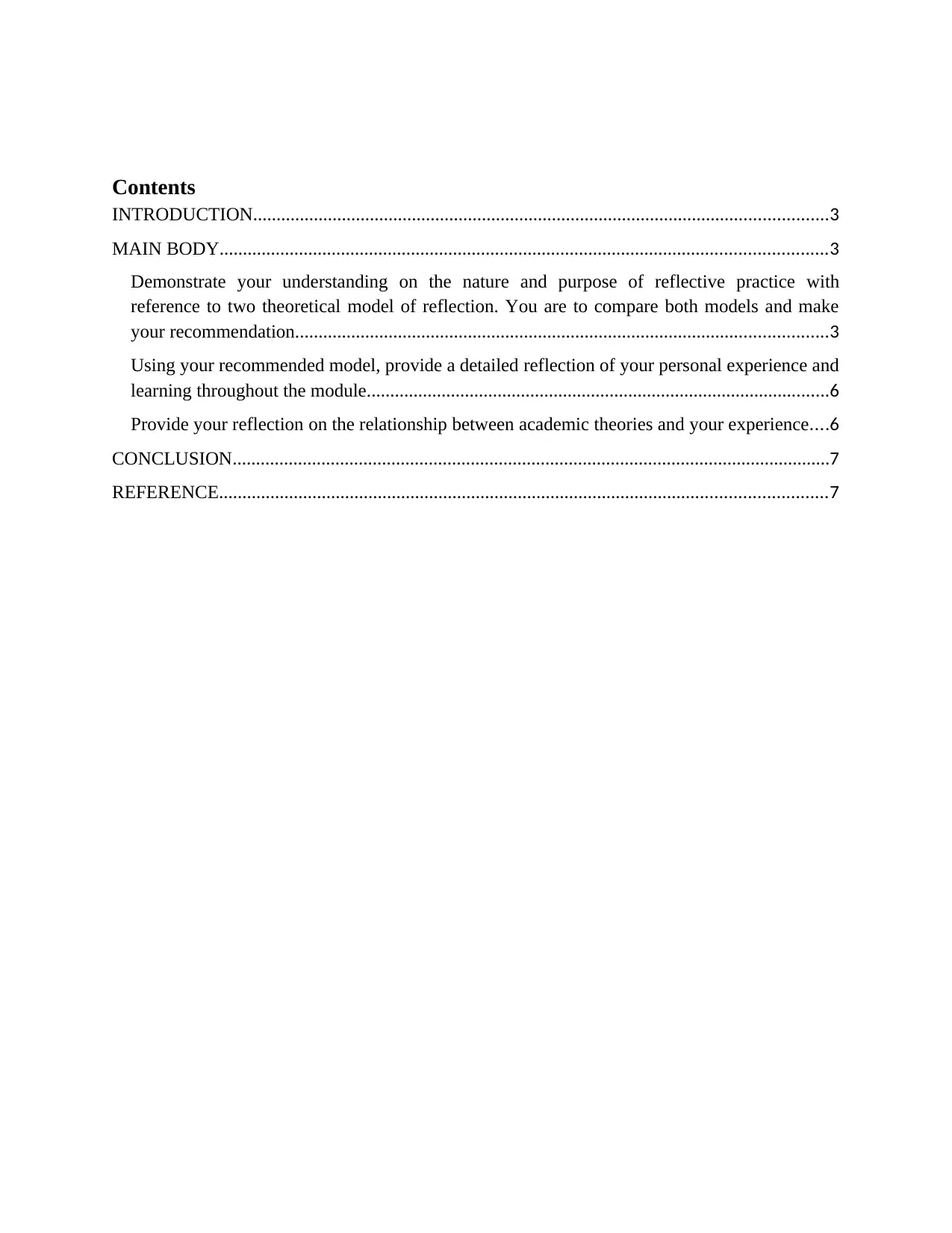
Contents
INTRODUCTION...........................................................................................................................3
MAIN BODY..................................................................................................................................3
Demonstrate your understanding on the nature and purpose of reflective practice with
reference to two theoretical model of reflection. You are to compare both models and make
your recommendation..................................................................................................................3
Using your recommended model, provide a detailed reflection of your personal experience and
learning throughout the module...................................................................................................6
Provide your reflection on the relationship between academic theories and your experience....6
CONCLUSION................................................................................................................................7
REFERENCE..................................................................................................................................7
INTRODUCTION...........................................................................................................................3
MAIN BODY..................................................................................................................................3
Demonstrate your understanding on the nature and purpose of reflective practice with
reference to two theoretical model of reflection. You are to compare both models and make
your recommendation..................................................................................................................3
Using your recommended model, provide a detailed reflection of your personal experience and
learning throughout the module...................................................................................................6
Provide your reflection on the relationship between academic theories and your experience....6
CONCLUSION................................................................................................................................7
REFERENCE..................................................................................................................................7
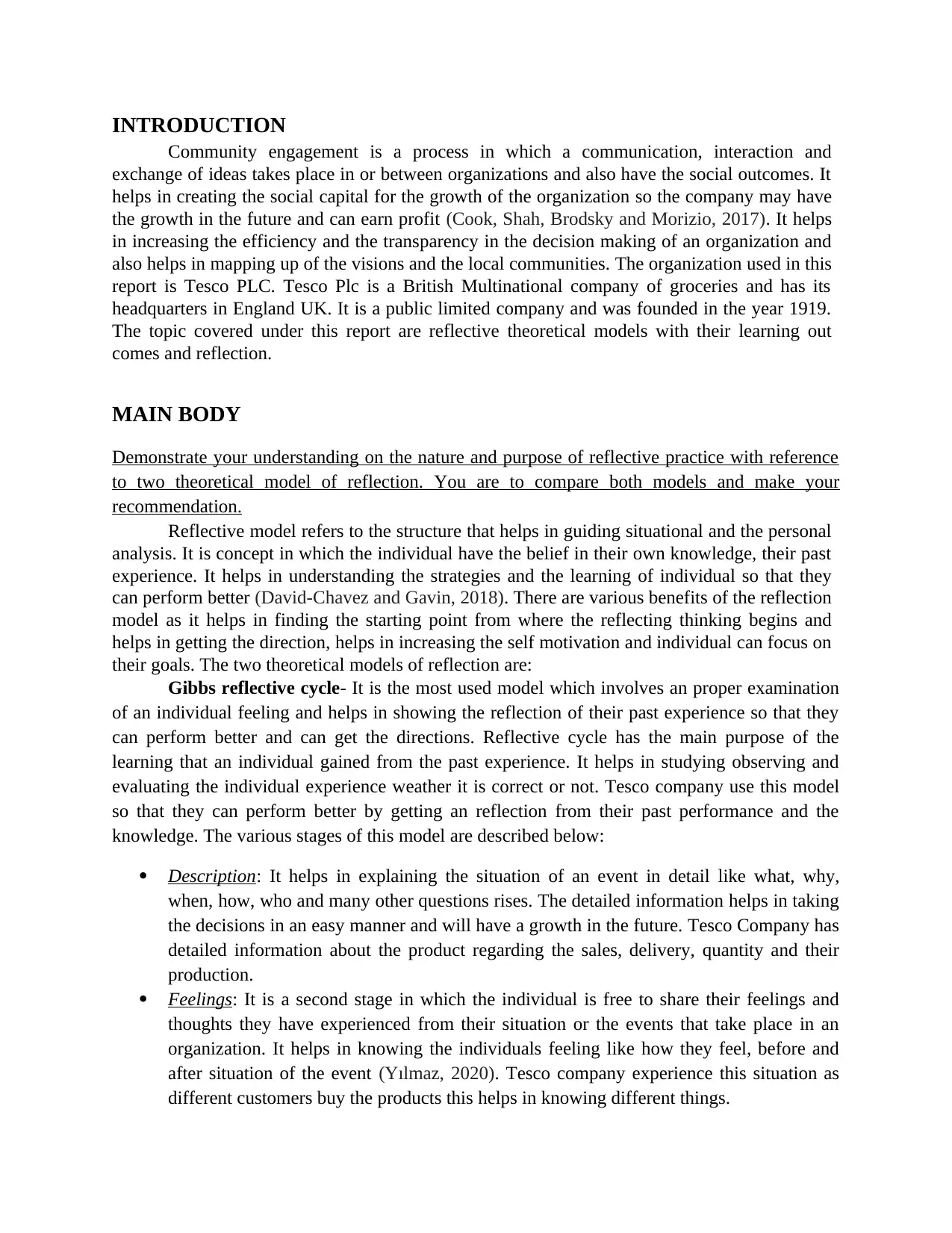
INTRODUCTION
Community engagement is a process in which a communication, interaction and
exchange of ideas takes place in or between organizations and also have the social outcomes. It
helps in creating the social capital for the growth of the organization so the company may have
the growth in the future and can earn profit (Cook, Shah, Brodsky and Morizio, 2017). It helps
in increasing the efficiency and the transparency in the decision making of an organization and
also helps in mapping up of the visions and the local communities. The organization used in this
report is Tesco PLC. Tesco Plc is a British Multinational company of groceries and has its
headquarters in England UK. It is a public limited company and was founded in the year 1919.
The topic covered under this report are reflective theoretical models with their learning out
comes and reflection.
MAIN BODY
Demonstrate your understanding on the nature and purpose of reflective practice with reference
to two theoretical model of reflection. You are to compare both models and make your
recommendation.
Reflective model refers to the structure that helps in guiding situational and the personal
analysis. It is concept in which the individual have the belief in their own knowledge, their past
experience. It helps in understanding the strategies and the learning of individual so that they
can perform better (David-Chavez and Gavin, 2018). There are various benefits of the reflection
model as it helps in finding the starting point from where the reflecting thinking begins and
helps in getting the direction, helps in increasing the self motivation and individual can focus on
their goals. The two theoretical models of reflection are:
Gibbs reflective cycle- It is the most used model which involves an proper examination
of an individual feeling and helps in showing the reflection of their past experience so that they
can perform better and can get the directions. Reflective cycle has the main purpose of the
learning that an individual gained from the past experience. It helps in studying observing and
evaluating the individual experience weather it is correct or not. Tesco company use this model
so that they can perform better by getting an reflection from their past performance and the
knowledge. The various stages of this model are described below:
Description: It helps in explaining the situation of an event in detail like what, why,
when, how, who and many other questions rises. The detailed information helps in taking
the decisions in an easy manner and will have a growth in the future. Tesco Company has
detailed information about the product regarding the sales, delivery, quantity and their
production.
Feelings: It is a second stage in which the individual is free to share their feelings and
thoughts they have experienced from their situation or the events that take place in an
organization. It helps in knowing the individuals feeling like how they feel, before and
after situation of the event (Yılmaz, 2020). Tesco company experience this situation as
different customers buy the products this helps in knowing different things.
Community engagement is a process in which a communication, interaction and
exchange of ideas takes place in or between organizations and also have the social outcomes. It
helps in creating the social capital for the growth of the organization so the company may have
the growth in the future and can earn profit (Cook, Shah, Brodsky and Morizio, 2017). It helps
in increasing the efficiency and the transparency in the decision making of an organization and
also helps in mapping up of the visions and the local communities. The organization used in this
report is Tesco PLC. Tesco Plc is a British Multinational company of groceries and has its
headquarters in England UK. It is a public limited company and was founded in the year 1919.
The topic covered under this report are reflective theoretical models with their learning out
comes and reflection.
MAIN BODY
Demonstrate your understanding on the nature and purpose of reflective practice with reference
to two theoretical model of reflection. You are to compare both models and make your
recommendation.
Reflective model refers to the structure that helps in guiding situational and the personal
analysis. It is concept in which the individual have the belief in their own knowledge, their past
experience. It helps in understanding the strategies and the learning of individual so that they
can perform better (David-Chavez and Gavin, 2018). There are various benefits of the reflection
model as it helps in finding the starting point from where the reflecting thinking begins and
helps in getting the direction, helps in increasing the self motivation and individual can focus on
their goals. The two theoretical models of reflection are:
Gibbs reflective cycle- It is the most used model which involves an proper examination
of an individual feeling and helps in showing the reflection of their past experience so that they
can perform better and can get the directions. Reflective cycle has the main purpose of the
learning that an individual gained from the past experience. It helps in studying observing and
evaluating the individual experience weather it is correct or not. Tesco company use this model
so that they can perform better by getting an reflection from their past performance and the
knowledge. The various stages of this model are described below:
Description: It helps in explaining the situation of an event in detail like what, why,
when, how, who and many other questions rises. The detailed information helps in taking
the decisions in an easy manner and will have a growth in the future. Tesco Company has
detailed information about the product regarding the sales, delivery, quantity and their
production.
Feelings: It is a second stage in which the individual is free to share their feelings and
thoughts they have experienced from their situation or the events that take place in an
organization. It helps in knowing the individuals feeling like how they feel, before and
after situation of the event (Yılmaz, 2020). Tesco company experience this situation as
different customers buy the products this helps in knowing different things.
⊘ This is a preview!⊘
Do you want full access?
Subscribe today to unlock all pages.

Trusted by 1+ million students worldwide
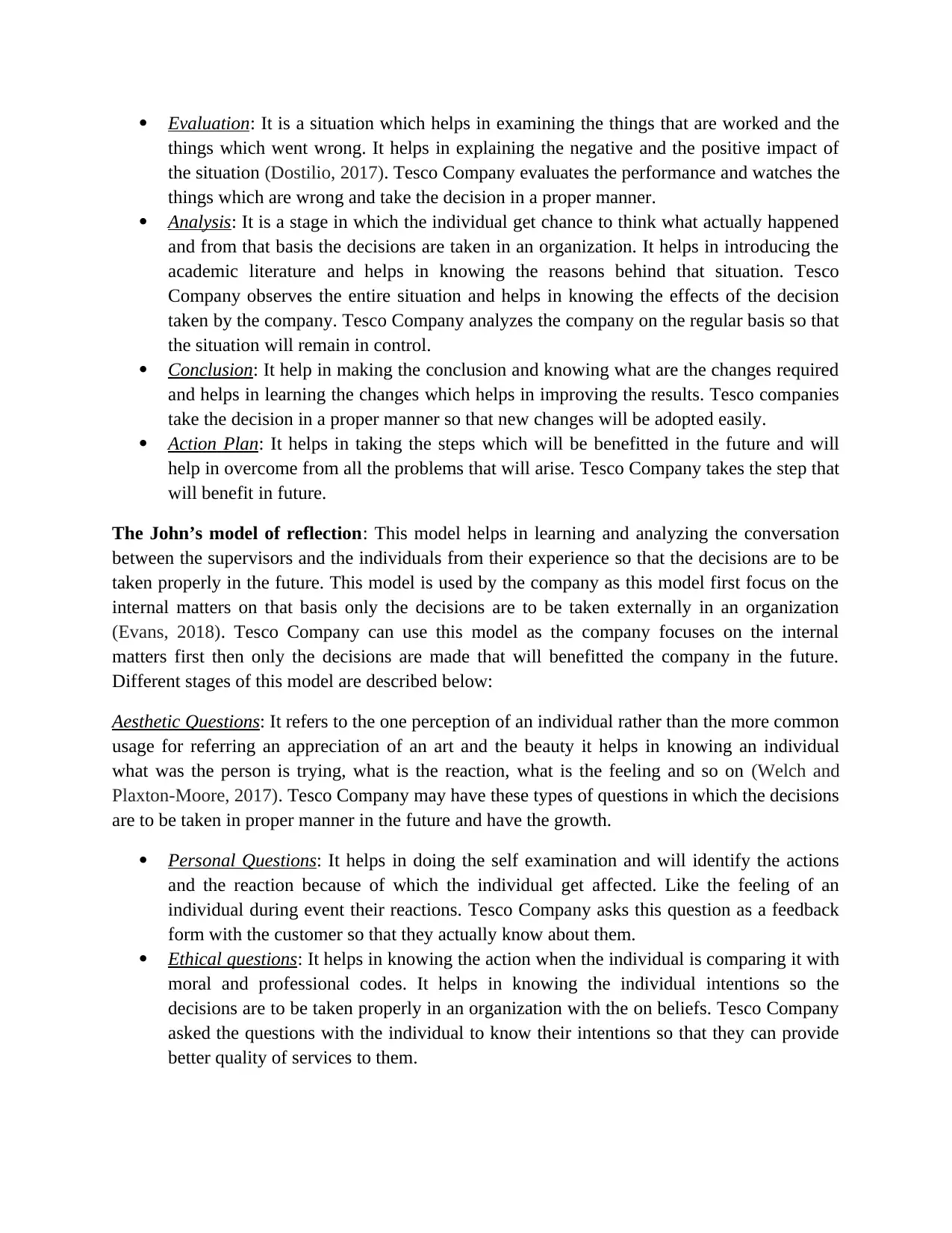
Evaluation: It is a situation which helps in examining the things that are worked and the
things which went wrong. It helps in explaining the negative and the positive impact of
the situation (Dostilio, 2017). Tesco Company evaluates the performance and watches the
things which are wrong and take the decision in a proper manner.
Analysis: It is a stage in which the individual get chance to think what actually happened
and from that basis the decisions are taken in an organization. It helps in introducing the
academic literature and helps in knowing the reasons behind that situation. Tesco
Company observes the entire situation and helps in knowing the effects of the decision
taken by the company. Tesco Company analyzes the company on the regular basis so that
the situation will remain in control.
Conclusion: It help in making the conclusion and knowing what are the changes required
and helps in learning the changes which helps in improving the results. Tesco companies
take the decision in a proper manner so that new changes will be adopted easily.
Action Plan: It helps in taking the steps which will be benefitted in the future and will
help in overcome from all the problems that will arise. Tesco Company takes the step that
will benefit in future.
The John’s model of reflection: This model helps in learning and analyzing the conversation
between the supervisors and the individuals from their experience so that the decisions are to be
taken properly in the future. This model is used by the company as this model first focus on the
internal matters on that basis only the decisions are to be taken externally in an organization
(Evans, 2018). Tesco Company can use this model as the company focuses on the internal
matters first then only the decisions are made that will benefitted the company in the future.
Different stages of this model are described below:
Aesthetic Questions: It refers to the one perception of an individual rather than the more common
usage for referring an appreciation of an art and the beauty it helps in knowing an individual
what was the person is trying, what is the reaction, what is the feeling and so on (Welch and
Plaxton-Moore, 2017). Tesco Company may have these types of questions in which the decisions
are to be taken in proper manner in the future and have the growth.
Personal Questions: It helps in doing the self examination and will identify the actions
and the reaction because of which the individual get affected. Like the feeling of an
individual during event their reactions. Tesco Company asks this question as a feedback
form with the customer so that they actually know about them.
Ethical questions: It helps in knowing the action when the individual is comparing it with
moral and professional codes. It helps in knowing the individual intentions so the
decisions are to be taken properly in an organization with the on beliefs. Tesco Company
asked the questions with the individual to know their intentions so that they can provide
better quality of services to them.
things which went wrong. It helps in explaining the negative and the positive impact of
the situation (Dostilio, 2017). Tesco Company evaluates the performance and watches the
things which are wrong and take the decision in a proper manner.
Analysis: It is a stage in which the individual get chance to think what actually happened
and from that basis the decisions are taken in an organization. It helps in introducing the
academic literature and helps in knowing the reasons behind that situation. Tesco
Company observes the entire situation and helps in knowing the effects of the decision
taken by the company. Tesco Company analyzes the company on the regular basis so that
the situation will remain in control.
Conclusion: It help in making the conclusion and knowing what are the changes required
and helps in learning the changes which helps in improving the results. Tesco companies
take the decision in a proper manner so that new changes will be adopted easily.
Action Plan: It helps in taking the steps which will be benefitted in the future and will
help in overcome from all the problems that will arise. Tesco Company takes the step that
will benefit in future.
The John’s model of reflection: This model helps in learning and analyzing the conversation
between the supervisors and the individuals from their experience so that the decisions are to be
taken properly in the future. This model is used by the company as this model first focus on the
internal matters on that basis only the decisions are to be taken externally in an organization
(Evans, 2018). Tesco Company can use this model as the company focuses on the internal
matters first then only the decisions are made that will benefitted the company in the future.
Different stages of this model are described below:
Aesthetic Questions: It refers to the one perception of an individual rather than the more common
usage for referring an appreciation of an art and the beauty it helps in knowing an individual
what was the person is trying, what is the reaction, what is the feeling and so on (Welch and
Plaxton-Moore, 2017). Tesco Company may have these types of questions in which the decisions
are to be taken in proper manner in the future and have the growth.
Personal Questions: It helps in doing the self examination and will identify the actions
and the reaction because of which the individual get affected. Like the feeling of an
individual during event their reactions. Tesco Company asks this question as a feedback
form with the customer so that they actually know about them.
Ethical questions: It helps in knowing the action when the individual is comparing it with
moral and professional codes. It helps in knowing the individual intentions so the
decisions are to be taken properly in an organization with the on beliefs. Tesco Company
asked the questions with the individual to know their intentions so that they can provide
better quality of services to them.
Paraphrase This Document
Need a fresh take? Get an instant paraphrase of this document with our AI Paraphraser
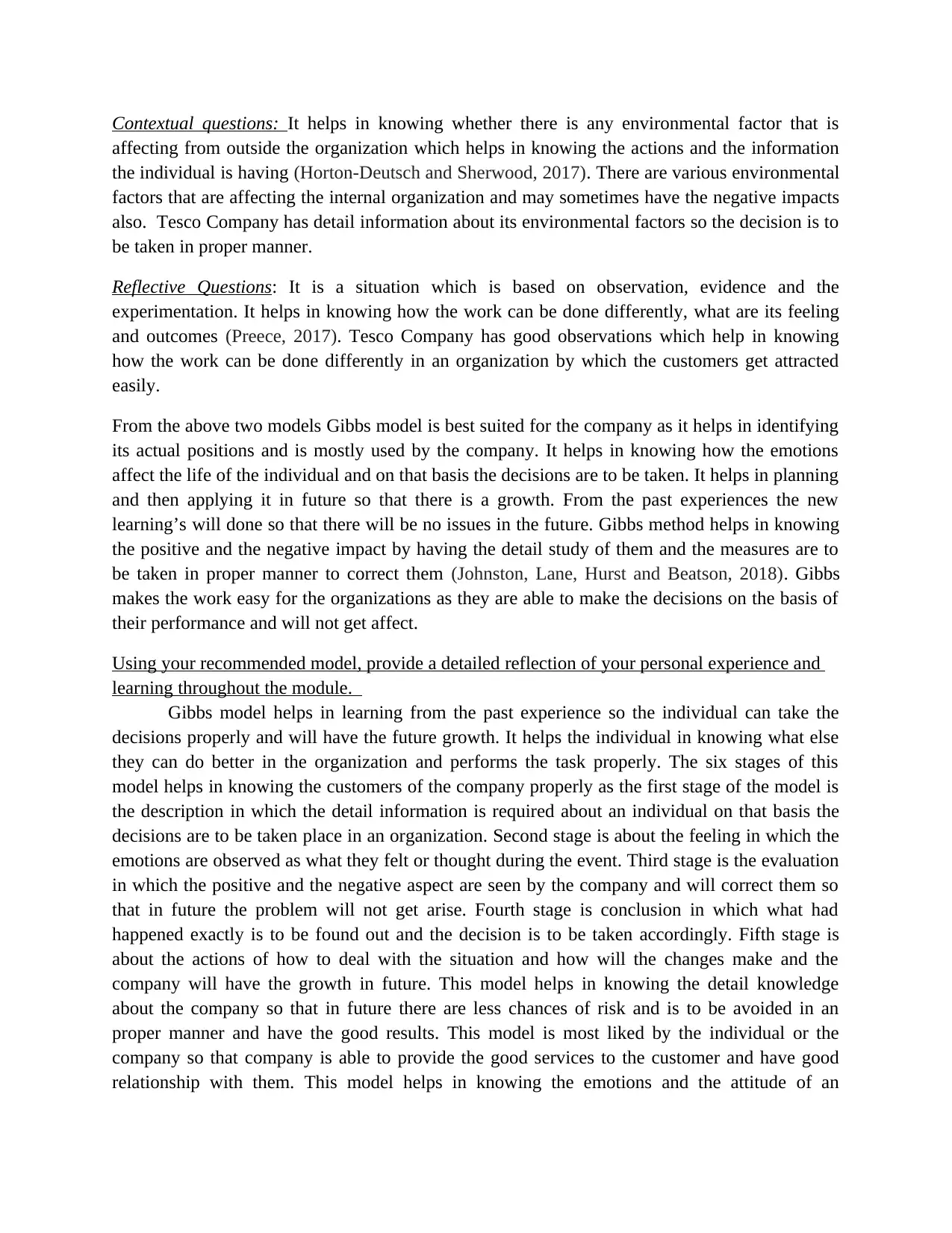
Contextual questions: It helps in knowing whether there is any environmental factor that is
affecting from outside the organization which helps in knowing the actions and the information
the individual is having (Horton-Deutsch and Sherwood, 2017). There are various environmental
factors that are affecting the internal organization and may sometimes have the negative impacts
also. Tesco Company has detail information about its environmental factors so the decision is to
be taken in proper manner.
Reflective Questions: It is a situation which is based on observation, evidence and the
experimentation. It helps in knowing how the work can be done differently, what are its feeling
and outcomes (Preece, 2017). Tesco Company has good observations which help in knowing
how the work can be done differently in an organization by which the customers get attracted
easily.
From the above two models Gibbs model is best suited for the company as it helps in identifying
its actual positions and is mostly used by the company. It helps in knowing how the emotions
affect the life of the individual and on that basis the decisions are to be taken. It helps in planning
and then applying it in future so that there is a growth. From the past experiences the new
learning’s will done so that there will be no issues in the future. Gibbs method helps in knowing
the positive and the negative impact by having the detail study of them and the measures are to
be taken in proper manner to correct them (Johnston, Lane, Hurst and Beatson, 2018). Gibbs
makes the work easy for the organizations as they are able to make the decisions on the basis of
their performance and will not get affect.
Using your recommended model, provide a detailed reflection of your personal experience and
learning throughout the module.
Gibbs model helps in learning from the past experience so the individual can take the
decisions properly and will have the future growth. It helps the individual in knowing what else
they can do better in the organization and performs the task properly. The six stages of this
model helps in knowing the customers of the company properly as the first stage of the model is
the description in which the detail information is required about an individual on that basis the
decisions are to be taken place in an organization. Second stage is about the feeling in which the
emotions are observed as what they felt or thought during the event. Third stage is the evaluation
in which the positive and the negative aspect are seen by the company and will correct them so
that in future the problem will not get arise. Fourth stage is conclusion in which what had
happened exactly is to be found out and the decision is to be taken accordingly. Fifth stage is
about the actions of how to deal with the situation and how will the changes make and the
company will have the growth in future. This model helps in knowing the detail knowledge
about the company so that in future there are less chances of risk and is to be avoided in an
proper manner and have the good results. This model is most liked by the individual or the
company so that company is able to provide the good services to the customer and have good
relationship with them. This model helps in knowing the emotions and the attitude of an
affecting from outside the organization which helps in knowing the actions and the information
the individual is having (Horton-Deutsch and Sherwood, 2017). There are various environmental
factors that are affecting the internal organization and may sometimes have the negative impacts
also. Tesco Company has detail information about its environmental factors so the decision is to
be taken in proper manner.
Reflective Questions: It is a situation which is based on observation, evidence and the
experimentation. It helps in knowing how the work can be done differently, what are its feeling
and outcomes (Preece, 2017). Tesco Company has good observations which help in knowing
how the work can be done differently in an organization by which the customers get attracted
easily.
From the above two models Gibbs model is best suited for the company as it helps in identifying
its actual positions and is mostly used by the company. It helps in knowing how the emotions
affect the life of the individual and on that basis the decisions are to be taken. It helps in planning
and then applying it in future so that there is a growth. From the past experiences the new
learning’s will done so that there will be no issues in the future. Gibbs method helps in knowing
the positive and the negative impact by having the detail study of them and the measures are to
be taken in proper manner to correct them (Johnston, Lane, Hurst and Beatson, 2018). Gibbs
makes the work easy for the organizations as they are able to make the decisions on the basis of
their performance and will not get affect.
Using your recommended model, provide a detailed reflection of your personal experience and
learning throughout the module.
Gibbs model helps in learning from the past experience so the individual can take the
decisions properly and will have the future growth. It helps the individual in knowing what else
they can do better in the organization and performs the task properly. The six stages of this
model helps in knowing the customers of the company properly as the first stage of the model is
the description in which the detail information is required about an individual on that basis the
decisions are to be taken place in an organization. Second stage is about the feeling in which the
emotions are observed as what they felt or thought during the event. Third stage is the evaluation
in which the positive and the negative aspect are seen by the company and will correct them so
that in future the problem will not get arise. Fourth stage is conclusion in which what had
happened exactly is to be found out and the decision is to be taken accordingly. Fifth stage is
about the actions of how to deal with the situation and how will the changes make and the
company will have the growth in future. This model helps in knowing the detail knowledge
about the company so that in future there are less chances of risk and is to be avoided in an
proper manner and have the good results. This model is most liked by the individual or the
company so that company is able to provide the good services to the customer and have good
relationship with them. This model helps in knowing the emotions and the attitude of an
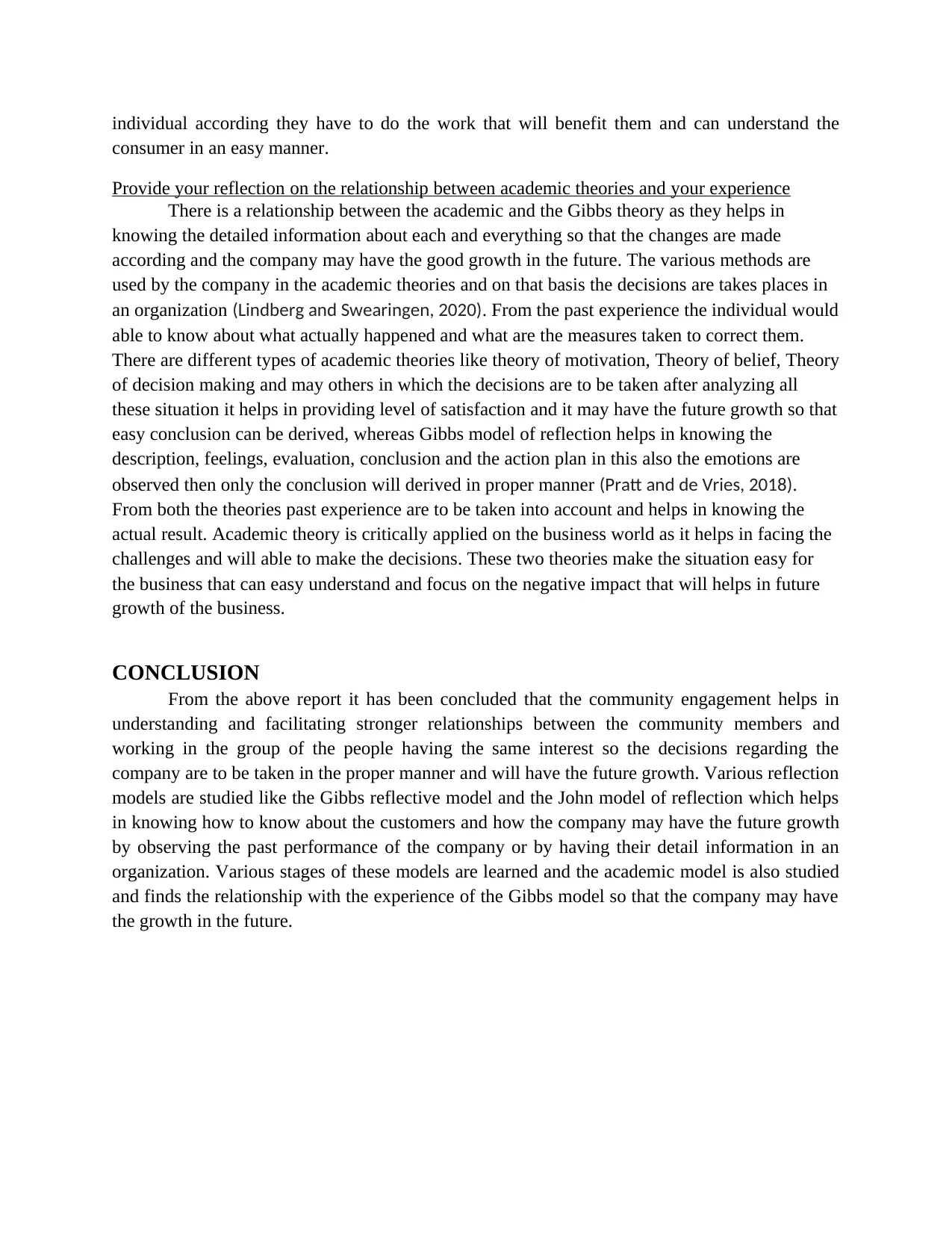
individual according they have to do the work that will benefit them and can understand the
consumer in an easy manner.
Provide your reflection on the relationship between academic theories and your experience
There is a relationship between the academic and the Gibbs theory as they helps in
knowing the detailed information about each and everything so that the changes are made
according and the company may have the good growth in the future. The various methods are
used by the company in the academic theories and on that basis the decisions are takes places in
an organization (Lindberg and Swearingen, 2020). From the past experience the individual would
able to know about what actually happened and what are the measures taken to correct them.
There are different types of academic theories like theory of motivation, Theory of belief, Theory
of decision making and may others in which the decisions are to be taken after analyzing all
these situation it helps in providing level of satisfaction and it may have the future growth so that
easy conclusion can be derived, whereas Gibbs model of reflection helps in knowing the
description, feelings, evaluation, conclusion and the action plan in this also the emotions are
observed then only the conclusion will derived in proper manner (Pratt and de Vries, 2018).
From both the theories past experience are to be taken into account and helps in knowing the
actual result. Academic theory is critically applied on the business world as it helps in facing the
challenges and will able to make the decisions. These two theories make the situation easy for
the business that can easy understand and focus on the negative impact that will helps in future
growth of the business.
CONCLUSION
From the above report it has been concluded that the community engagement helps in
understanding and facilitating stronger relationships between the community members and
working in the group of the people having the same interest so the decisions regarding the
company are to be taken in the proper manner and will have the future growth. Various reflection
models are studied like the Gibbs reflective model and the John model of reflection which helps
in knowing how to know about the customers and how the company may have the future growth
by observing the past performance of the company or by having their detail information in an
organization. Various stages of these models are learned and the academic model is also studied
and finds the relationship with the experience of the Gibbs model so that the company may have
the growth in the future.
consumer in an easy manner.
Provide your reflection on the relationship between academic theories and your experience
There is a relationship between the academic and the Gibbs theory as they helps in
knowing the detailed information about each and everything so that the changes are made
according and the company may have the good growth in the future. The various methods are
used by the company in the academic theories and on that basis the decisions are takes places in
an organization (Lindberg and Swearingen, 2020). From the past experience the individual would
able to know about what actually happened and what are the measures taken to correct them.
There are different types of academic theories like theory of motivation, Theory of belief, Theory
of decision making and may others in which the decisions are to be taken after analyzing all
these situation it helps in providing level of satisfaction and it may have the future growth so that
easy conclusion can be derived, whereas Gibbs model of reflection helps in knowing the
description, feelings, evaluation, conclusion and the action plan in this also the emotions are
observed then only the conclusion will derived in proper manner (Pratt and de Vries, 2018).
From both the theories past experience are to be taken into account and helps in knowing the
actual result. Academic theory is critically applied on the business world as it helps in facing the
challenges and will able to make the decisions. These two theories make the situation easy for
the business that can easy understand and focus on the negative impact that will helps in future
growth of the business.
CONCLUSION
From the above report it has been concluded that the community engagement helps in
understanding and facilitating stronger relationships between the community members and
working in the group of the people having the same interest so the decisions regarding the
company are to be taken in the proper manner and will have the future growth. Various reflection
models are studied like the Gibbs reflective model and the John model of reflection which helps
in knowing how to know about the customers and how the company may have the future growth
by observing the past performance of the company or by having their detail information in an
organization. Various stages of these models are learned and the academic model is also studied
and finds the relationship with the experience of the Gibbs model so that the company may have
the growth in the future.
⊘ This is a preview!⊘
Do you want full access?
Subscribe today to unlock all pages.

Trusted by 1+ million students worldwide
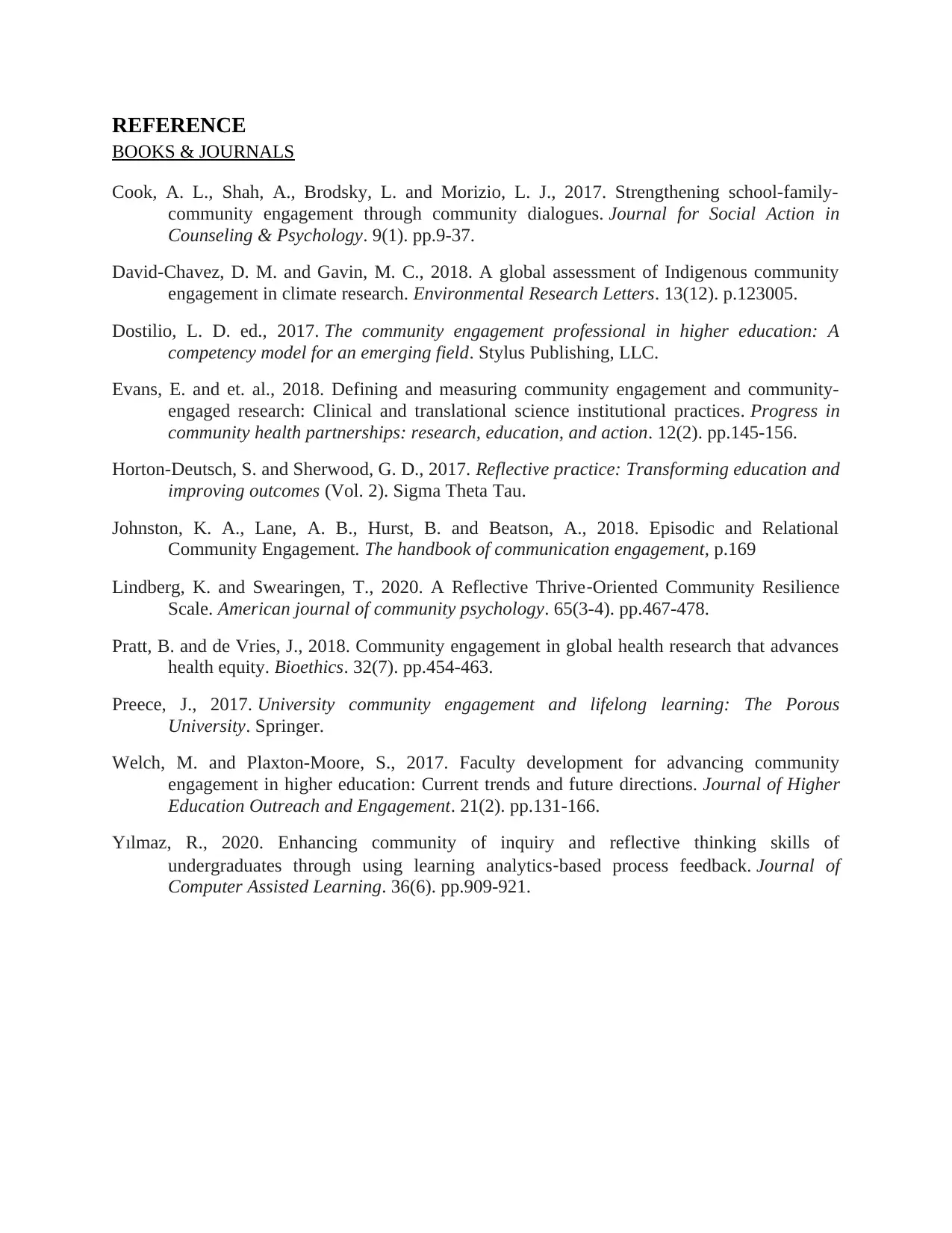
REFERENCE
BOOKS & JOURNALS
Cook, A. L., Shah, A., Brodsky, L. and Morizio, L. J., 2017. Strengthening school-family-
community engagement through community dialogues. Journal for Social Action in
Counseling & Psychology. 9(1). pp.9-37.
David-Chavez, D. M. and Gavin, M. C., 2018. A global assessment of Indigenous community
engagement in climate research. Environmental Research Letters. 13(12). p.123005.
Dostilio, L. D. ed., 2017. The community engagement professional in higher education: A
competency model for an emerging field. Stylus Publishing, LLC.
Evans, E. and et. al., 2018. Defining and measuring community engagement and community-
engaged research: Clinical and translational science institutional practices. Progress in
community health partnerships: research, education, and action. 12(2). pp.145-156.
Horton-Deutsch, S. and Sherwood, G. D., 2017. Reflective practice: Transforming education and
improving outcomes (Vol. 2). Sigma Theta Tau.
Johnston, K. A., Lane, A. B., Hurst, B. and Beatson, A., 2018. Episodic and Relational
Community Engagement. The handbook of communication engagement, p.169
Lindberg, K. and Swearingen, T., 2020. A Reflective Thrive‐Oriented Community Resilience
Scale. American journal of community psychology. 65(3-4). pp.467-478.
Pratt, B. and de Vries, J., 2018. Community engagement in global health research that advances
health equity. Bioethics. 32(7). pp.454-463.
Preece, J., 2017. University community engagement and lifelong learning: The Porous
University. Springer.
Welch, M. and Plaxton-Moore, S., 2017. Faculty development for advancing community
engagement in higher education: Current trends and future directions. Journal of Higher
Education Outreach and Engagement. 21(2). pp.131-166.
Yılmaz, R., 2020. Enhancing community of inquiry and reflective thinking skills of
undergraduates through using learning analytics‐based process feedback. Journal of
Computer Assisted Learning. 36(6). pp.909-921.
BOOKS & JOURNALS
Cook, A. L., Shah, A., Brodsky, L. and Morizio, L. J., 2017. Strengthening school-family-
community engagement through community dialogues. Journal for Social Action in
Counseling & Psychology. 9(1). pp.9-37.
David-Chavez, D. M. and Gavin, M. C., 2018. A global assessment of Indigenous community
engagement in climate research. Environmental Research Letters. 13(12). p.123005.
Dostilio, L. D. ed., 2017. The community engagement professional in higher education: A
competency model for an emerging field. Stylus Publishing, LLC.
Evans, E. and et. al., 2018. Defining and measuring community engagement and community-
engaged research: Clinical and translational science institutional practices. Progress in
community health partnerships: research, education, and action. 12(2). pp.145-156.
Horton-Deutsch, S. and Sherwood, G. D., 2017. Reflective practice: Transforming education and
improving outcomes (Vol. 2). Sigma Theta Tau.
Johnston, K. A., Lane, A. B., Hurst, B. and Beatson, A., 2018. Episodic and Relational
Community Engagement. The handbook of communication engagement, p.169
Lindberg, K. and Swearingen, T., 2020. A Reflective Thrive‐Oriented Community Resilience
Scale. American journal of community psychology. 65(3-4). pp.467-478.
Pratt, B. and de Vries, J., 2018. Community engagement in global health research that advances
health equity. Bioethics. 32(7). pp.454-463.
Preece, J., 2017. University community engagement and lifelong learning: The Porous
University. Springer.
Welch, M. and Plaxton-Moore, S., 2017. Faculty development for advancing community
engagement in higher education: Current trends and future directions. Journal of Higher
Education Outreach and Engagement. 21(2). pp.131-166.
Yılmaz, R., 2020. Enhancing community of inquiry and reflective thinking skills of
undergraduates through using learning analytics‐based process feedback. Journal of
Computer Assisted Learning. 36(6). pp.909-921.
1 out of 7
Related Documents
Your All-in-One AI-Powered Toolkit for Academic Success.
+13062052269
info@desklib.com
Available 24*7 on WhatsApp / Email
![[object Object]](/_next/static/media/star-bottom.7253800d.svg)
Unlock your academic potential
Copyright © 2020–2026 A2Z Services. All Rights Reserved. Developed and managed by ZUCOL.




